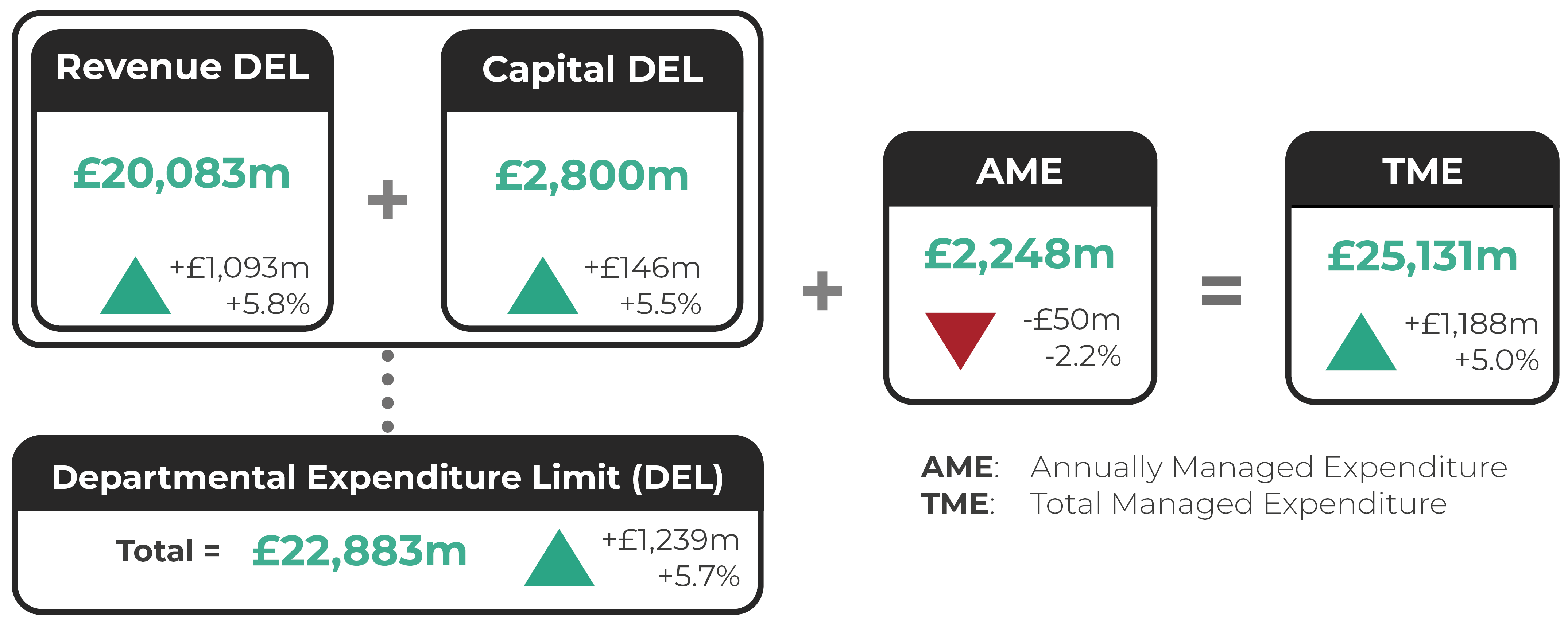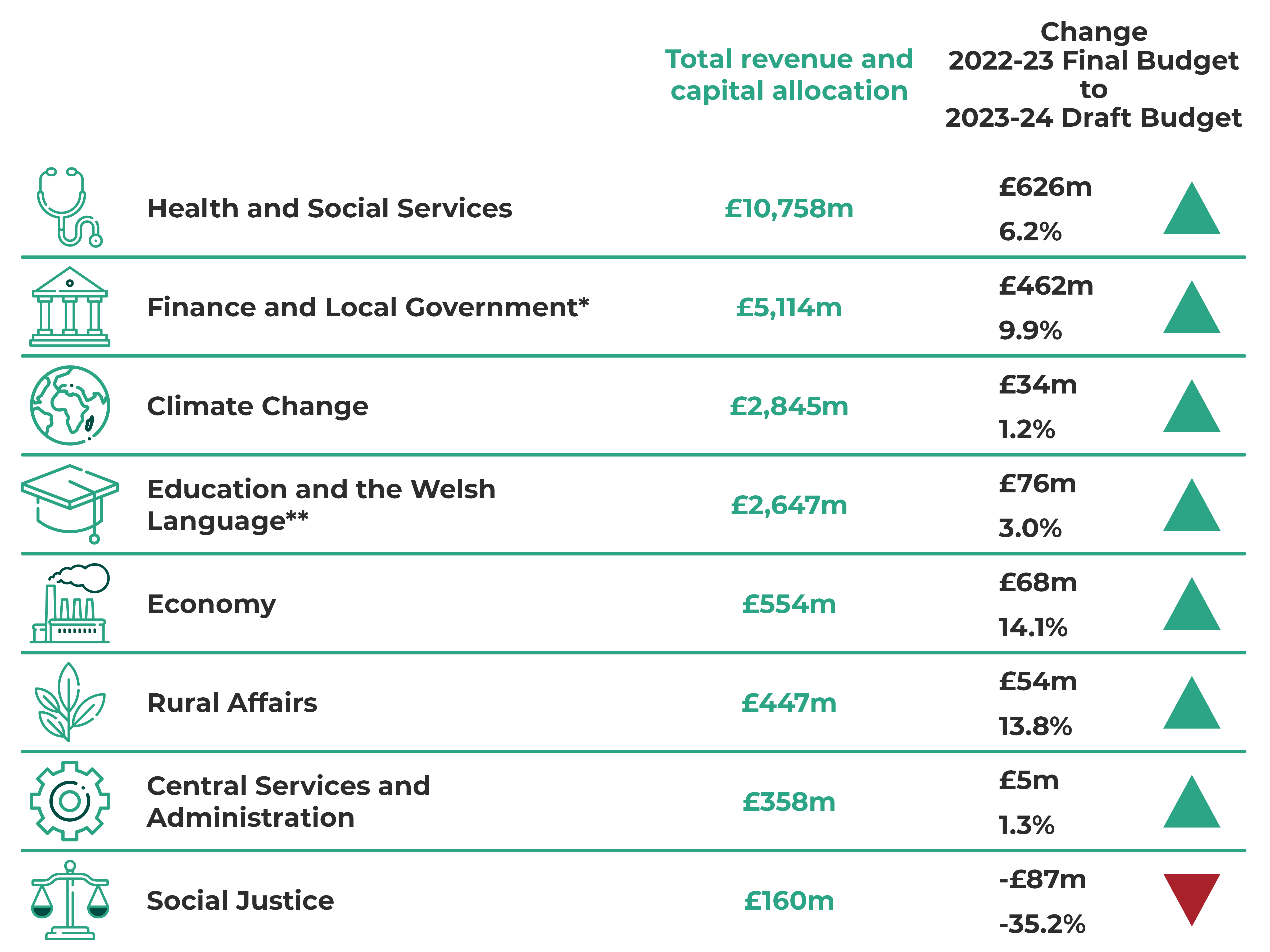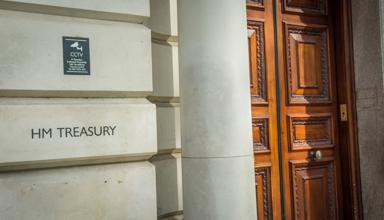The Senedd has started 2023 with a busy schedule scrutinising the Welsh Government’s most recent spending plans. Our article in December, published just before the Welsh Government’s Draft Budget 2023-24, set out areas the government may look to prioritise. In this article, we set out five things we’ve learnt since then.
The Draft Budget 2023-24, comes during “a perfect storm of economic and budgetary pressures” and the Welsh Government described it as “one of the most difficult since devolution”. On 13 December 2022, the Welsh Government’s Chief Economist said Wales and the UK appeared to be entering a recession – highlighting the difficult circumstances during the publication of this Budget.
Overview of the Draft Budget
The total Welsh Government budget for 2023-24 is over £25.1 bn (see Figure 1, below). Of this, £20.1bn is allocated to Welsh Government departments for day-to-day spending.
Figure 1 Welsh Government Draft Budget 2023-24 Allocations

The largest total increase for 2023-24 in value terms, compared with the Final Budget 2022-23, is for the Health and Social Services department (£626m, see Figure 2 below), which will receive 47% of the total amount allocated for spending within the Welsh Government’s control in 2023-24. Funding for the Social Justice department is set to decrease by £87m compared to the Final Budget 2022-23.
Figure 2. Draft Budget 2023-24 spend by Department

* Excludes around £0.9 billion non-domestic rates income.
** Includes allocation of £488 million of non-fiscal revenue due to student loans.
Figures are rounded. Refer to the Welsh Government Draft Budget 2023-24 for exact figures.
The Welsh Government says this Draft Budget is “unlike any other since devolution”
The Welsh Government says a “perfect storm” of economic and budgetary pressures mean the 2023-24 is budget unlike any since devolution. It says it has prioritised funding around three key investment pillars:
- Protecting frontline public services and ambitions for the future.
- Continuing to provide help to those most impacted by “the crises we face”.
- Supporting the economy through recessionary times.
It’s also looked to reprioritise funding as part of the budgetary process, with £87.4m redirected from previous plans to the “areas of greatest need”.
However, talking specifically about capital, the Institute for Fiscal Studies said while more information was available than in England, there was a lack of detail on what had been delayed, scaled back or “shelved” by the Welsh Government.
Unprecedented inflationary pressures mean the budget won’t go as far as previously thought
The Office for National Statistics reported (18 January 2023) that the Consumer Prices Index (CPI) rose by 10.5% in the 12 months to December 2022.
The Welsh Government acknowledges £666m additional revenue for 2023-24 and £509m in 2024-25, relating to decisions in the UK Government’s Autumn Statement. However, even with that the Welsh Government says:
…the settlement could be worth up to £3bn less in real terms over the three years covered by the Spending Review and £1bn less in 2023-24 alone.
While the capital funding available for 2023-24 hasn’t changed from that set out last year, the Welsh Government says those budgets will be 8% lower in real terms in 2024-25 than 2022-23.
The Welsh Government will not be making changes to income tax
The Welsh Government has the power to vary the income tax by 10p in every £1 of income for each band, with the remainder of the rate set by the UK Government.
Even though the 2023-24 budget has been “one of the toughest” it’s ever made, Welsh Rates of Income Tax remain unchanged which keeps income tax rates in-line with those in England.
This is in line with its commitment to “not take more in Welsh Rates of Income Tax from people for at least as long as the economic impact of Covid-19 lasts”. When the Finance Committee asked about raising the higher and additional rates, the Minister for Finance and Local Government noted the Welsh Government doesn’t yet know the behavioural impact of such a change. She said:
It just felt in the cost-of-living crisis that, with all of the challenges that we have, this wasn't the time to experiment.
The Future Generations Commissioner for Wales suggested raising the higher rate of income tax was something the Welsh Government should consider in future, “even if it's just to protect some of the really challenging priority areas”.
There’s funding for cost of living rises but stakeholders suggest more could be done
In this year’s Draft Budget, the Welsh Government has provided support in response to the cost of living increase which builds on the package in the Final Budget 2022-23. This includes an additional £18.8m for the Discretionary Assistance Fund (DAF), an additional £9m for the Pupil Development Grant and £10m to prevent homelessness.
While welcoming these commitments, Chwarae Teg, Citizen’s Advice Cymru and the Bevan Foundation raised concerns that the Draft Budget 2023-24 does not adequately address childcare costs, provide a suitable replacement for the Welsh Winter Fuel Scheme or provide sufficient support for learners through the Education Maintenance Allowance, respectively.
As part of this year’s Draft Budget, the Budget Improvement and Impact Advisory Group (BIIAG) provided evidence on “strategic Budget priorities” and worked with the Welsh Government to develop the Strategic Integrated Impact Assessment (SIIA), to ensure “every pound invested makes the greatest positive impact”.
The Senedd Finance Committee heard from Chwarae Teg, one of the members of the BIIAG (12 January 2023), that it felt the SIIA was better this year and could “see some improvements” but there was a “way to go”.
The budget includes extra funding for the NHS and local government, but pressures remain
Core funding for local government, along with allocations for finance, health and social services make up the majority of the revenue and capital allocated in the Welsh Government’s budget. The 22 local authorities are due to receive £5.5bn in 2023-24, which is around £400m or 7.9% more than 2022-23. Meanwhile, revenue funding for delivery of core NHS services is increasing by around £390m or 4.3%, to £9.6bn.
The Welsh Local Government Association (WLGA) welcomed the funding being made available for local authorities, saying it gives them a “fighting chance”, but also that it was inevitable there will be “reductions in service levels” and headcount. The Welsh NHS Confederation welcomed the uplift to social worker’s pay but highlighted that the “NHS is currently facing its greatest ever financial challenge”.
Prior to the budget being published, the WLGA had calculated local authorities faced £784m of cumulative pressures in 2023-24. Representatives of the NHS said it was facing pressures “far higher than we’ve ever seen before”.
Bodies representing the NHS and local government also highlighted pressures on the workforce, particularly in terms of recruitment, retention and development of staff.
What’s next?
This article covers just some of the things to emerge from the Senedd’s scrutiny of the Draft Budget. Monday (6 February 2022) is the deadline for Senedd Committees to publish their budget scrutiny reports, which will be published on the Senedd Research website. The Draft Budget will then be debated in Plenary on 7 February, which will available to watch live on Senedd TV.
Following the scrutiny process, the Welsh Government will publish its Final Budget 2023-24 on 28 February 2023. For more information, an interactive tool on the Draft Budget 2023-24 is available on the Senedd Research website.
Article by Božo Lugonja, Owen Holzinger, Joe Wilkes and Joanne McCarthy Senedd Research, Welsh Parliament






